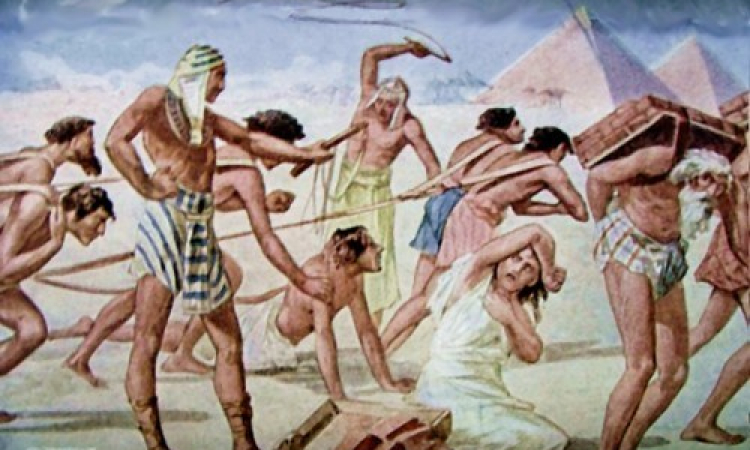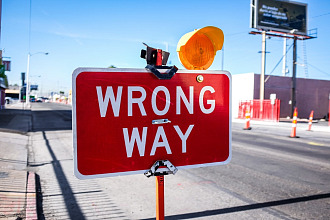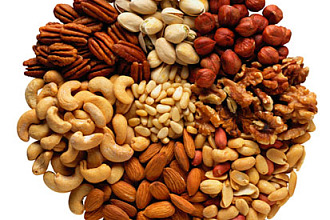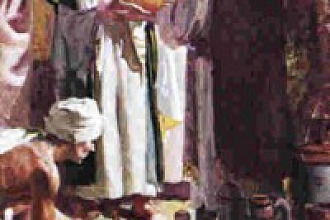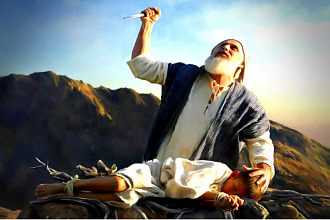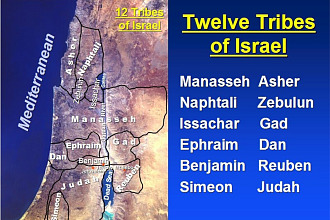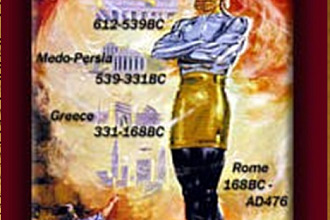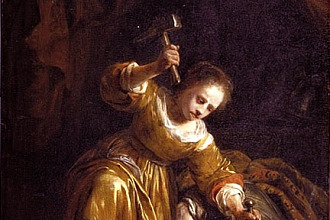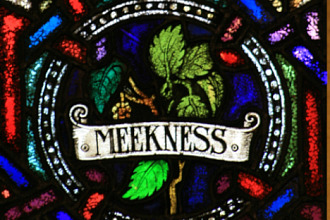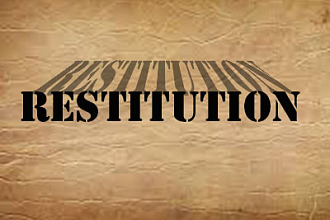“‘And if one of your brethren who dwells by you becomes poor, and sells himself to you, you shall not compel him to serve as a slave.
As a hired servant and a sojourner he shall be with you, and shall serve you until the Year of Jubilee. And then he shall depart from you—he and his children with him—and shall return to his own family. He shall return to the possession of his fathers. For they are My servants, whom I brought out of the land of Egypt; they shall not be sold as slaves. You shall not rule over him with rigor, but you shall fear your God.
And as for your male and female slaves whom you may have—from the nations that are around you, from them you may buy male and female slaves. Moreover you may buy the children of the strangers who dwell among you, and their families who are with you, which they beget in your land; and they shall become your property. And you may take them as an inheritance for your children after you, to inherit them as a possession; they shall be your permanent slaves. But regarding your brethren, the children of Israel, you shall not rule over one another with rigor.’”Leviticus 25:39-46
Many criticize the Torah because it allowed for purchasing slaves from other nations. However, I think we should carefully criticize the reasoning that projects the form of slavery practiced by many onto the Torah without actually reading what it says. Slavery in the Torah was more of a last resort for financial problems or a welfare system of sorts by which someone could live and work in exchange for survival and even Israelis might sell themselves into slavery for some sort of relief. While punishment for slaves (as well as free people) was permitted, the institution of slavery as outlined in the Torah was not meant to be the legalized abuse of others as many made it out to be.
Whatever the case or status of the slave, be it permanent or temporary, we know God encouraged Israel to keep their own past experiences as slaves in Egypt in mind when dealing with others. “Also you shall not oppress a stranger, for you know the heart of a stranger, because you were strangers in the land of Egypt.” Exodus 23:9 “‘and if a stranger dwells with you in your land, you shall not mistreat him.’” Leviticus 19:33. So we should not read “they [outsiders/strangers] shall be your permanent slaves. But regarding your brethren, the children of Israel, you shall not rule over one another with rigor.” as permission to rule over non-Israelis with rigor. As unfortunate as it is, many people tend to be kinder to strangers than their own family so that injunction may have been to avoid that.
The Torah says “You shall not give back to his master the slave who has escaped from his master to you. He may dwell with you in your midst, in the place which he chooses within one of your gates, where it seems best to him; you shall not oppress him.” Deuteronomy 23:15-16. “The stranger who dwells among you shall be to you as one born among you, and you shall love him as yourself; for you were strangers in the land of Egypt: I am the Lord your God.” Leviticus 19:34. So while the Torah did in fact allow for the purchase of and permanent slavery of strangers (or foreigners), they were not to be treated any more harshly or thought of as any less important than fellow Israelites. And if a slave ran away from his or her master for some reason the Torah commanded that the person was not to be returned to the slave master, but instead should find refuge free from oppression in a place of the slave’s choice among Israel. So, far from condoning oppression, the Torah shows freedom from oppression was a slave’s right.
If the Torah’s principles were consistently followed instead of cherry picked to suit the reader’s wishes, rather than painting a negative image of God, oddly the purchase of slaves from other nations would have been a great way to illustrate the goodness of God. When slaves of non-Torah believing nations experienced and the asked about their unusually compassionate treatment by the Israelis (which they should have received, but I’m not claiming they always did), compared to other nations, it would have been a good opportunity for Israel to tell them about their own history as slaves in Egypt and how their God heard the cries of the oppressed and deliverered and introduced them to the loving principles of God’s law.
When non-Torah believing slave owners from other nations saw how poor their treatment of slaves were compared to the kindness shown in Israel they could be provoked by shame to improve the way they treat others. “’Indeed He says, ‘It is too small a thing that You should be My Servant to raise up the tribes of Jacob, and to restore the preserved ones of Israel; I will also give You as a light to the Gentiles, that You should be My salvation to the ends of the earth.’” Isaiah 49:6 Although many people may have failed, Israel as God’s servant was and is supposed to be an example to the nations by doing things better, not worse, or just like everyone else.
So while being free is nice and I prefer it, if people actually obeyed what the Torah said about the treatment of others and I was a captive of war or in some other bad situation thousands of years ago and became a slave in another country I would rather become the permanent slave of a Torah believer instead of purchased by someone else who didn’t know the God of Israel. The Torah said not to oppress the stranger and to remember they were slaves in Egypt. And if they remembered that they were slaves and would know that they are no longer oppressed because they serve a God who sympathies with the suffering. So they should extend the same freedoms and compassion they longed to have as slaves to others that are in that situation. For most, slavery means oppression, but rather than condoning the senseless abuse of others the Torah actually teaches it does not have to be that way and if something is wrong slaves have the right to choose to get away and live where they want without fearing oppression in Israel.
Picture originally found here

